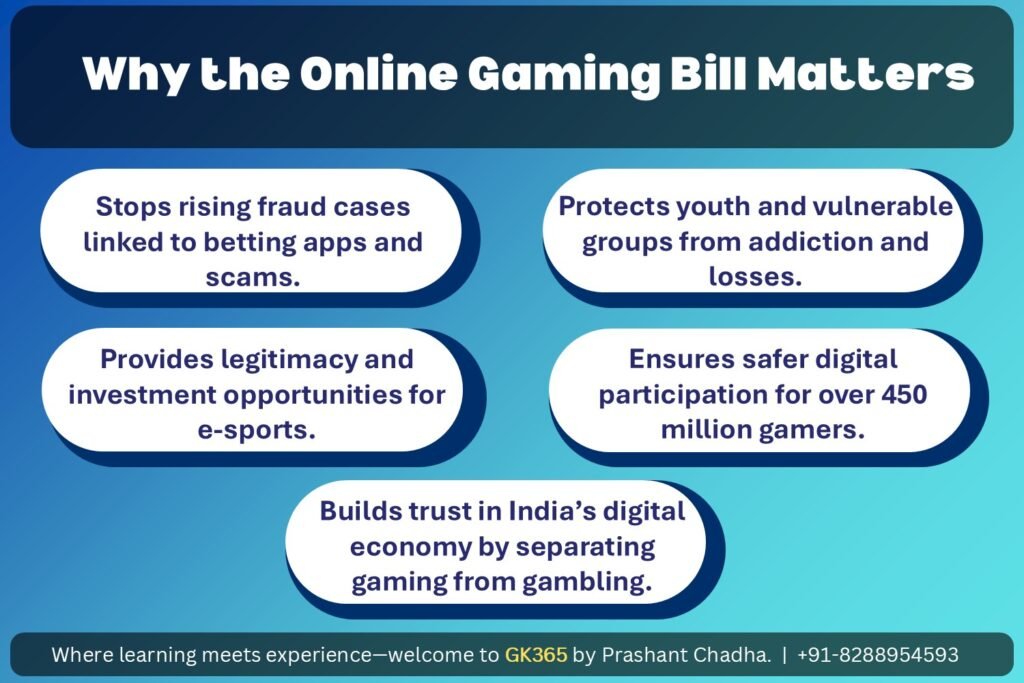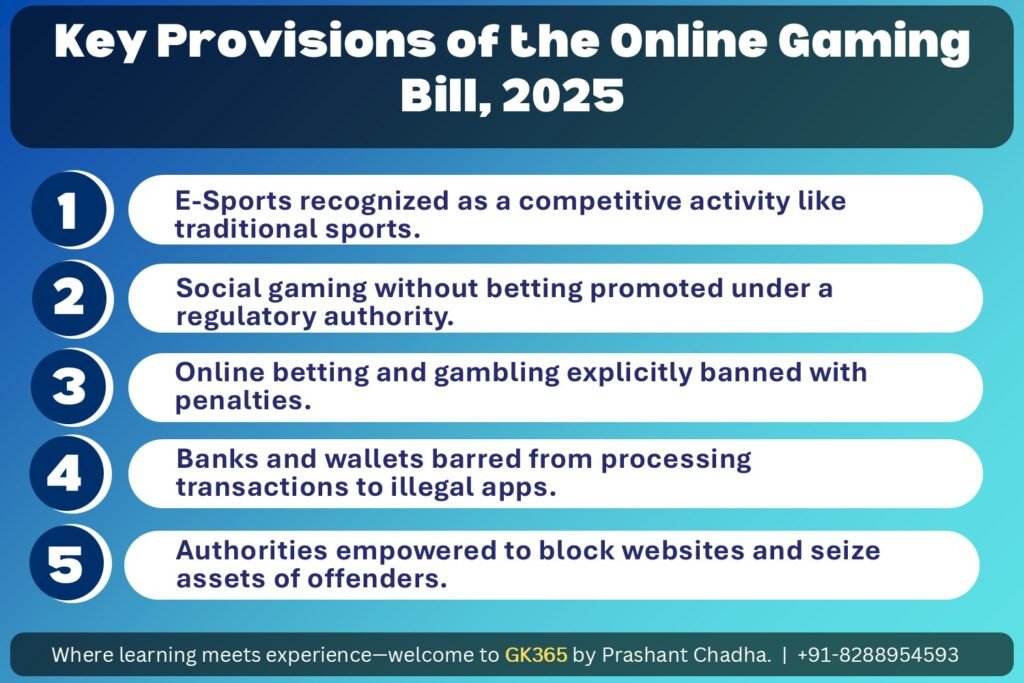Cabinet Approves Online Gaming Bill to Regulate E-Sports and Ban Online Betting
The Union Cabinet, chaired by Prime Minister Narendra Modi, has cleared the Online Gaming Bill, 2025. The proposed law seeks to regulate India’s fast-growing digital gaming industry by promoting e-sports and social gaming while banning online betting. The Bill will be introduced in the Lok Sabha soon, making betting and money gaming punishable offences.
This comes at a time when India’s gaming sector is booming but faces concerns over fraud, misleading advertisements, and addiction. The Bill aims to establish a clear legal framework that separates legitimate gaming from harmful money-based platforms.
Table of Contents
- Introduction
- Background: The Need for Regulation
- Key Provisions of the Online Gaming Bill
- Why the Bill Matters
- Impact on Stakeholders
- Challenges in Implementation
- Global Comparisons
- Long-Term Prospects for India’s Gaming Industry
- Parliamentary Path Ahead
- Conclusion
- Key Takeaways Table
Background: The Need for Regulation
India has over 450 million online gamers, making it one of the largest markets worldwide. Cheap data, affordable smartphones, and a young population have driven this growth. The industry is expected to cross ₹40,000 crore by 2028.
But the rise has brought risks. Betting apps, often disguised as casual games, have grown unchecked. Several fraud cases revealed how such apps lure users with promises of quick earnings, causing financial losses. Students and young people have been among the worst affected.
States struggled to regulate betting due to the absence of a central law, leading to patchy enforcement. The new Bill provides a uniform national framework.
Key Provisions of the Online Gaming Bill
Promotion of E-Sports and Online Social Games
- A regulatory authority will oversee e-sports and social gaming.
- E-sports will be recognized as a competitive activity like traditional sports.
- Social gaming without betting will be encouraged as part of India’s digital economy.
Prohibition of Online Money Gaming
- Offering or promoting betting or gambling online is a criminal offence.
- Operators, advertisers, and middlemen involved in money gaming face penalties.
Ban on Gaming Advertisements
- Ads for money-based gaming will be banned.
- Celebrities and influencers endorsing such platforms risk fines.
Financial Restrictions
- Banks, wallets, and payment gateways cannot transfer money to betting platforms.
- Institutions must block transactions linked to illegal apps.
Enforcement and Penalties
- Authorities can search, seize, and investigate illegal operators.
- Penalties include fines, imprisonment, and stronger measures for repeat offenders.
- Websites and apps promoting money gaming can be blocked.
Why the Bill Matters
Rising Fraud Cases
India has seen scams involving fraudulent gaming apps and money laundering networks. The Bill shuts down financial channels and makes betting a defined offence.
Protecting Consumers
The law shields vulnerable users, especially youth, from addiction and losses. Families will also see reduced disputes linked to gambling debts.
Boosting the E-Sports Industry
By separating skill-based gaming from betting, the Bill gives legitimacy to e-sports. This recognition could bring investment, jobs, and international exposure for Indian players.
Impact on Stakeholders
- Players and Consumers: Clearer rules ensure safer participation.
- E-Sports Startups and Investors: Recognition makes it easier to attract funding and build tournaments.
- Celebrities and Influencers: Endorsing betting apps can now lead to penalties.
- Financial Institutions: Banks and gateways must strengthen monitoring systems.
- Law Enforcement: Agencies will have more authority to block sites and prosecute offenders.
Challenges in Implementation
Effective enforcement will require coordination across agencies. Betting operators often host servers abroad, making tracking difficult. Public awareness campaigns will be needed to help users distinguish legal gaming from gambling apps.
Global Comparisons
- China: Strong restrictions on betting and gaming for minors.
- United States: State-level regulation, with many states banning betting but supporting e-sports.
- Singapore: Licensing system for regulated platforms.
India’s model bans betting but supports e-sports, striking a balance between consumer safety and economic growth.
Long-Term Prospects for India’s Gaming Industry
The Bill could reshape India’s gaming future. Cleaning up fraudulent apps will build trust, while recognition of e-sports can create careers in streaming, coaching, and event management. Industry estimates suggest India could be among the top five global e-sports markets by 2030.
Parliamentary Path Ahead
The Bill, already cleared by the Cabinet, will be introduced in the Lok Sabha soon. Cross-party support is expected due to public concern over betting scams. Debate may focus on regulatory powers and enforcement methods, but the direction is clear: India needs a strong central law.
Conclusion
The Online Gaming Bill, 2025 is a landmark reform. It separates e-sports from gambling, bans betting and misleading ads, and blocks financial channels to illegal platforms. At the same time, it promotes e-sports as a recognized and growing industry.
Challenges in enforcement remain, but the Bill sets India on a path to becoming a leader in responsible gaming—where innovation can thrive without compromising consumer safety.

Key Takeaways Table
| Aspect | Details |
|---|---|
| India’s Gaming Market | Over 450 million gamers, industry projected to cross ₹40,000 crore by 2028. |
| Bill Objective | Promote e-sports & social gaming while banning online betting. |
| Key Provisions | Ban on money gaming & ads, financial restrictions, penalties, and site blocking. |
| Consumer Protection | Shields youth from addiction and financial losses; reduces fraud cases. |
| Impact on Industry | Boosts legitimacy of e-sports; attracts investment and jobs. |
| Stakeholders Affected | Players, startups, influencers, financial institutions, and law enforcement. |
| Global Comparison | Similar bans in China; regulated models in US & Singapore. |
| Future Outlook | India could be in top 5 global e-sports markets by 2030. |


